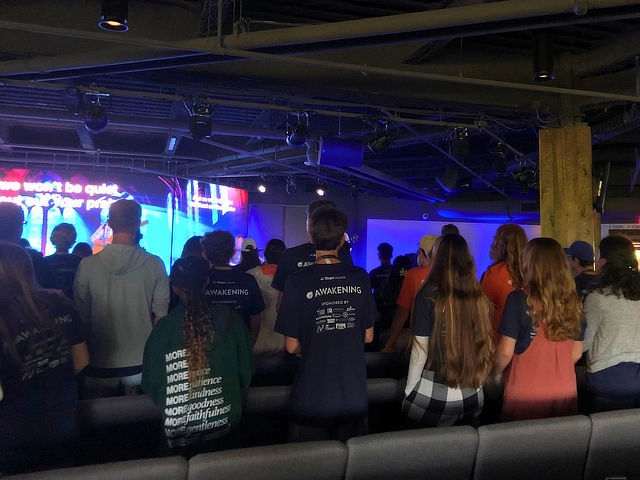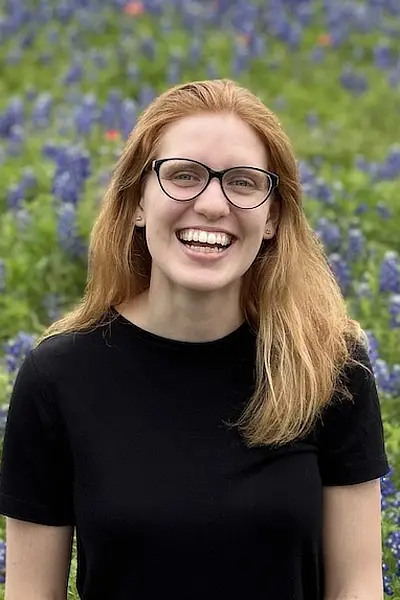
As a young adult who values, studies, and regularly participates in Christian worship, I sometimes think of myself as an anomaly. My perspective is changing, though, especially after visiting Hope College this summer to work as a research assistant at a camp called Awakening that equips high school students to lead worship. Forty-seven students registered for Awakening this year, and most of the 17 people on the staff team are under the age of 30.
It was a delightful surprise to see so many young people convening to deepen their understanding of worship.
In the three days at Hope College with Dr. Nelson Cowan, we attended five worship services, interviewed eight staff members, and conducted focus groups with 18 campers. This work contributes to a larger research project that explores the factors that motivate young people to participate in Christian worship. Although it will take much more time and data analysis to formulate a conclusion, I want to share my initial impression of young people at Awakening as a way of affirming and generating wider interest in our research topic.
We cannot escape embodied responses to worship – such as closed eyes or raised hands. This is true for young, middle-aged, and senior adults alike. However, when it comes to young people, I wonder if we sometimes assume that worship only affects them if they respond in an exuberant or affirmative fashion, perhaps by seeking leadership opportunities, shedding tears, or asking questions after a service. Awakening reminded me that worship affects all young people—for better or for worse—and it causes them to reflect.
While reflections on worship often remain unspoken or subconscious, Nelson and I engaged in conversations with campers and staff that brought their diverse perspectives to the surface. I met someone who longs for “silent time” in worship, someone who takes careful notice of architecture when she enters a worship space, someone who likes singing in unfamiliar languages, and someone who distinguishes between “praise” music and “worship” music. People spoke from Catholic, Lutheran, Reformed, and non-denominational perspectives, revealing the depth and breadth of their experiences!
My conversations at Awakening made it clear that I am far from the only young person who notices the intricacies of worship and ascribes meaning to them. While it is true that anyone’s experience of worship shapes their unique perspective, regardless of their age, the cohort of young people at Awakening seemed especially attentive to what their experiences were teaching them and curious about what they might learn from other people’s experiences.
In a focus group, one camper described a ritual of “pouring water” that occurs each week where she worships, and although that experience was unfamiliar to everyone else in the group, it fascinated her peers and seemed to increase their respect for her. They were so eager to exchange these kinds of stories, opinions, and ideas that I rarely needed to speak. It surprised me, and I think that it surprised them as well. Staff members didn’t expect their responses to my questions would take the full length of the interview time slot, and the campers in my focus group who initially encouraged me to rush through the questions were willing to admit by the end of our time together that it “went by so fast.”
There are many more stages of this valuable research project that will unfold in the coming months, but in the meantime, Awakening taught me that we must not discount the impact of worship experiences on young people. Likewise, we must not overlook or undervalue the thoughtful perspectives that young people form in response to their worship experiences.
Worship matters to young people, and if we want to understand the “how” and “why” factors behind that statement, we need to consult young people themselves. Our research project is responding to that need, and I look forward to continuing to learn through it that I am not such an anomaly after all.
"Young People and Christian Worship: Experiences, Stories, and Values” (YPCW) is a collaborative research project jointly sponsored by Saint Paul University, Ottawa, Ontario, and Samford University’s Center for Worship and the Arts, Birmingham, AL. It is a binational, multisite, ecumenical, mixed-methods exploration of how young people (13-18 and 19-29) experience public Christian worship. Primary investigators include Emily Snider Andrews, PhD, Nelson Cowan, PhD, and Sarah Kathleen Johnson, PhD. The YPCW study is made possible thanks to generous funding from Lilly Endowment, Inc., the Calvin Institute of Christian, and Baylor University’s Future Church Grant program.

Mykayla Turner holds a Master of Sacred Music with a Liturgical Musicology concentration and a Master of Theological Studies. She obtained her A.C.C.M. in Piano Performance from Conservatory Canada. Currently, she is a PhD student in the Faculty of Theology at Saint Paul University in Ottawa, ON. Apart from her academic work, she is an active church musician and liturgist. She also co-directs Ontario Mennonite Music Camp and chairs the team of volunteers who maintain Together in Worship, a curated collection of free worship resources from Anabaptist sources.
For further reading on this project, check out:
“Research at CWA: Big things are coming!” by Nelson Cowan and Emily Snider Andrews
